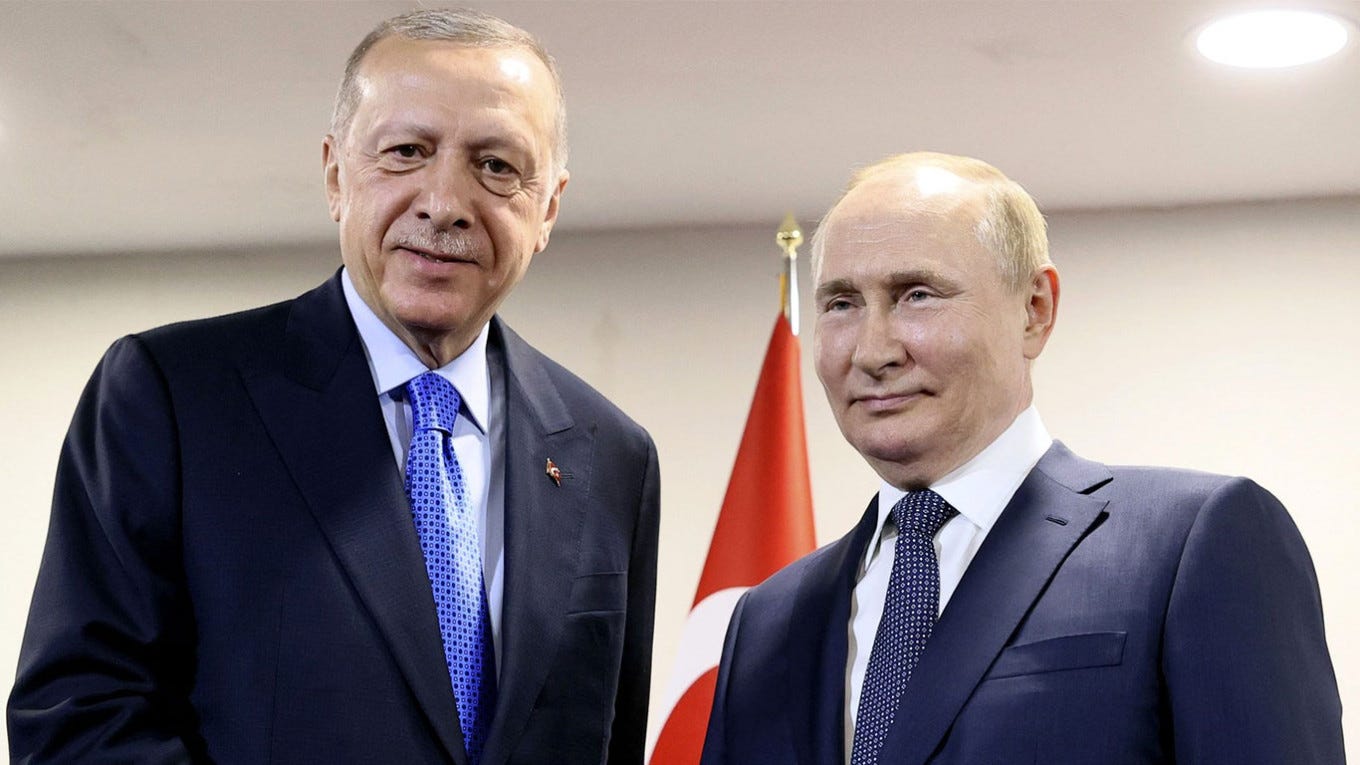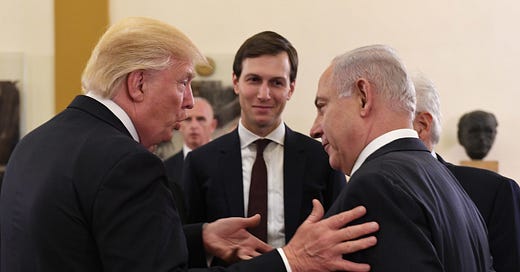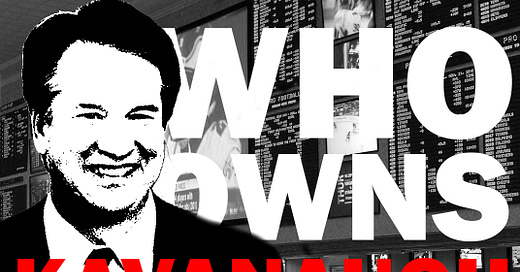
All Roads Lead to Ankara
The autocratic president of the Republic of Türkiye, Recep Tayyip Erdoğan, has his fingers in many different American pies.
Istanbul was Constantinople, and the country formerly known as Turkey now wants to be called Türkiye. However you spell it, the nation comprising the remains of the Ottoman Empire—and the increasingly autocratic government led by Recep Tayyip Erdoğan—has significant ties to a number of prominent U.S. figures, as we shall examine.
Founded in AD 330 by Constantine the Great on the site of a backwater on the Bosporus called Byzantium, Nova Roma—or Constantinople, as the locals called it—was the capital of the Eastern Roman Empire for eleven hundred years. Safeguarded by unnavigable currents on three sides and the Theodosian Walls on the fourth, the city was famously impregnable. Even Atilla the Hun couldn’t break through. Constantinople was sacked only twice in 11 centuries: first by the crooked, blind Doge of Venice and his armies during the Fourth Crusade of 1204; and again in 1453, by the Ottoman Turks, who slew the last Roman Emperor, Constantine XI Dragaš Palaeologus, took the great city as their capital, and have held it ever since.
The warlike Ottomans fought the Genoese in 1475, the Poles in 1503, the Hungarians at Mohács in 1526 and the Habsburgs at the same place in 1687. Through the centuries, the Ottoman Empire expanded its dominions, clashing frequently with the Safavids, the Venetians, the Serbs, the Croats, the Albanians, the Russians, and, famously, Vlad the Impaler, as the European nations of Christendom sought to “repulse the Turks.” At its height under Suleiman the Magnificent, the Ottoman Empire controlled all of the lands bordering the Black Sea; all of Southeastern Europe, including today’s Greece, Serbia, Croatia, Bosnia, Slovenia, Albania, Romania, Hungary, and much of Ukraine; all of the Maghreb; and the Arabian coastline, and with it, the holy cities of Mecca and Medina.
In the nineteenth century, the Ottoman Empire began its slow, ineluctable decline. It lost to the Greeks in 1832, to the Russians in 1829, to the Egyptians in 1833, to the Albanians in 1839, to the Serbs in 1877, to the Montenegrins in 1878 and the Austro-Hungarians the same year, to the French in 1881 and the British in 1882, to the Qataris in 1893, to the Cretans in 1898, to the Italians in 1912. By the turn of the last century, the Western European powers were licking their collective chops, dreaming of seizing and divvying up Ottoman lands in the Middle East; how they chose to do so roils the political situation there to this day.
The Ottomans were on the winning side in the Crimean War and the losing side in World War I; during the latter, from 1915-17, the Ottoman state engineered the systematic eradication of Armenians from its territories, a genocide the current government still denies.
The Republic of Turkey was established in 1923, fought on the Allied side in the Second World War, and has been a U.S. ally for 80 years, mostly owing to its strategic military importance; the U.S. has some two dozen nuclear bombs at Incirlik Air Base. Türkiye is a key member of NATO, boasting the second-largest standing army in that coalition, but is not part of the European Union.
The Turkish human rights record has always been a bit sketchy. Eleven decades after the atrocities that so inspired Hitler, the government still refuses to acknowledge the Armenian Genocide. Ethnic Kurds face discrimination there, and Türkiye’s steadfast refusal to accept a nation of Kurdistan on its Eastern border is a key reason why a Kurdish state was not established in Northern Iraq after the Gulf War. Its treatment of women and the LGBT community leaves much to be desired, and, especially under the despotic Erdoğan regime, there has been an increasing crackdown on freedom of the press.
Like Saudi Arabia, Türkiye is a U.S. ally ruled by a government that is, shall we say, less democratically inclined than most Americans would prefer. And like the Kingdom’s MbS, Erdoğan has played footsie with Putin, who just last week confirmed that he would be meeting with the Turkish president at the BRICS summit later this month.
An acronym of “Brazil, Russia, India/Iran, China, and South Africa,” BRICS is basically a more palatable incarnation of George W. Bush’s Axis of Evil. Being a member of both BRICS and NATO is like playing in the Beatles and the Rolling Stones simultaneously. And yet Türkiye has explicitly stated its desire to throw in with Moscow, Tehran, and Beijing. As a party spokesman said recently, Erdoğan “has many times stated that we want to become a BRICS member. The process is now underway.”
The recent indictment of New York Mayor Eric Adams has put Erdoğan and Türkiye in the spotlight. But as I discovered, the embattled mayor’s Turkish Airlines flights are not the only things connecting through Istanbul.
Here are some key U.S. figures with ties to the Erdoğan regime:
Eric Adams
In the long annals of Gotham, Adams is the first and only sitting New York City mayor to be indicted—but somehow also the second New York City mayor to be indicted this year. According to the Justice Department, Adams defrauded city taxpayers to the tune of $10 million in an egregious “straw donor” scheme, while also indulging himself with free or cut-rate airline tickets, luxury hotel stays, extravagant diners, and god knows what else.
All of that is standard-issue, garden-variety bribery. The real question on everyone’s mind is, “Why Türkiye?” When asked that question on SNL’s “Weekend Update,” Devon Walker’s Eric Adams replied, with a scoundrel’s grin, “Gobble, gobble!” And that about covers it, as far as the mayor goes.
But what did the Turks hope to gain from Eric Adams? Certainly they didn’t spend half a decade cultivating this asset just to skip some steps in opening a new consulate. Were there more sketchy real estate deals in the works? More political favors? Was a hostile foreign government laundering money through Ankara? Because the Turkish government has done such a thing before, per the 2019 indictment of. . .
Halkbank
Türkiye Halk Bankasi A.S., Halkbank for short, is majority-owned by the Turkish state. The bank “allegedly conspired to undermine the United States Iran sanctions regime by illegally giving Iran access to billions of dollars’ worth of funds, all while deceiving U.S. regulators about the scheme,” John Demers, the assistant Attorney General for National Security, said at the time. “This is one of the most serious Iran sanctions violations we have seen, and no business should profit from evading our laws or risking our national security.”
The DOJ goes on to explain how the scheme worked:
The proceeds of Iran’s sale of oil and gas to Turkey’s national oil company and gas company, among others, were deposited at Halkbank, in accounts in the names of the Central Bank of Iran, the National Iranian Oil Company (NIOC), and the National Iranian Gas Company. During the relevant time period, Halkbank was the sole repository of proceeds from the sale of Iranian oil by NIOC to Turkey. Because of U.S. sanctions against Iran and the anti-money laundering policies of U.S. banks, it was difficult for Iran to access these funds in order to transfer them back to Iran or to use them for international financial transfers for the benefit of Iranian government agencies and banks. As of in or about 2012, billions of dollars’ worth of funds had accumulated in NIOC and the Central Bank of Iran’s accounts at Halkbank.
Halkbank participated in several types of illicit transactions for the benefit of Iran that, if discovered, would have exposed the bank to sanctions under U.S. law, including (i) allowing the proceeds of sales of Iranian oil and gas deposited at Halkbank to be used to buy gold for the benefit of the Government of Iran; (ii) allowing the proceeds of sales of Iranian oil and gas deposited at Halkbank to be used to buy gold that was not exported to Iran, in violation of the so-called “bilateral trade” rule; and (iii) facilitating transactions fraudulently designed to appear to be purchases of food and medicine by Iranian customers, in order to appear to fall within the so-called “humanitarian exception” to certain sanctions against the Government of Iran, when in fact no purchases of food or medicine actually occurred. Through these methods, Halkbank illicitly transferred approximately $20 billion worth of otherwise restricted Iranian funds.
The Halkbank case is still wending its way through the U.S. court system; as best as I can tell, it has yet to be resolved. But whatever the ultimate outcome, it seems clear the bank really was doing what was alleged; at the time of Halkbank’s indictment, one of its top executives, Mehmet Hakan Atilla, had already been convicted of bank fraud and sanctions evasions and sentenced to 32 months in federal prison.
Cooperating with the DOJ and testifying in the Atilla trial was. . .
Reza Zarrab
. . . a Millennial Iranian gold dealer with a Turkish passport and close ties to both Erdoğan and Mahmoud Ahmadinejad, the former president of Iran.
In 2013, Zarrab found himself at the center of a bribery scandal in Türkiye, when he was arrested in Istanbul and accused of “bribery, professional misconduct, bid rigging, and smuggling.” His alleged co-conspirators included a Who’s Who of family members of Turkish cabinet officials. The case was dismissed a few months later, shut down by Erdoğan, who was prime minister at the time and not terribly eager to risk revealing his potential involvement in the graft.
Not content to limit his scofflawing to Türkiye, Zarrab used one of his four passports—presumably not the Iranian one—to enter the United States, where he continued his life of crime. After his arrest in 2016 on charges related to bank fraud and sanctions evasion, he “flipped,” testifying against Atilla, as mentioned, and claiming that Erdoğan had personally approved the scheme. The day he appeared in U.S. court, the Turkish government confiscated his property in Türkiye, the timing of which smacked of retaliation.
Zarrab had hoped to be released to Ankara as part of a prisoner exchange between the U.S. and Türkiye. To lobby for that outcome on his behalf, he hired. . .
Rudy Giuliani
. . . the other Mayor of New York that was indicted this year. Rudy flew out to Ankara in February 2017 with former Bush II attorney general Mike Mukasey, also retained by Zarrab, to meet with Erdoğan.
You’re not gonna believe this, but Giuliani was unsuccessful in his lobbying efforts on Zarrab’s behalf, despite his being the personal attorney of another prominent American with ties to Erdoğan . . .
Donald Trump
. . . who allegedly asked his Secretary of State, Rex Tillerson, to get Zarrab’s case dropped, demonstrating both his willingness to do dirty work for Türkiye and his ignorance of how the federal government works.
Some speculate that Trump fired Preet Bharara, who’d been the first U.S. Attorney to indict Zarrab, to placate Erdoğan, after a high-ranking Turkish official accused Bharara of being in cahoots with enemies of the Turkish state. Despite being asked by Trump in November 2016 to stay on the job, Bharara was sacked via Twitter on March 11, 2017, a few weeks after Giuliani returned from his sit-down with Erdoğan.
During Erdoğan’s 2017 state visit to Washington, on the same day he met with Trump, members of his security detail beat up some pro-Kurdish protestors who were demonstrating in front of the Turkish ambassador’s residence. Erdoğan was at the residence at the time. Also injured in the skirmish, provoked without cause by Erdoğan’s goons, were members of the U.S. Secret Service.
None of this seemed to bother Trump, who said he is a “big fan” of the corrupt Turkish autocrat. Which makes sense, when you consider that they have a mutual friend, a Turkish businessman from Kazakhstan named . . .
Tevfik Arif
. . . a “fixer,” who was busted in the vacation town of Antalya in October of 2010—exactly 14 years ago today—for allegedly running a sex trafficking ring on a Turkish yacht once owned by Kemal Atatürk, the founding father of Türkiye.
The Black Sea, a non-profit, independent platform that offers “narrative-driven, in-depth journalism and investigations on Turkey, Southeast Europe and beyond,” wrote about Trump’s former business partner—and onetime employer of Felix Sater—back in 2016:
Tevfik Arif is a Kazakh-born businessman, with links to the Turkish chain Rixos Hotels, the giant building firm Sembol Construction and Bayrock.
In 2001, Arif co-founded real estate group Bayrock, where he operated out of a Fifth Avenue office in Trump Tower, along with Felix Sater, a convicted felon who enjoyed Government protection for informing on the mob for the FBI.
In 2004, the Bayrock Group began receiving what in total would become ten million Euro in equity contributions. In a 2010 complaint filed to a New Jersey court, a confidential informant told the plaintiffs that this money came from Tevfik Arif's brother in Russia, “who had access to cash accounts at a chromium refinery in Kazakhstan”.
This is likely to be his brother Refik.
During the time when Bayrock was receiving mysterious cash injections from Kazakhstan, Bayrock and Donald Trump began working on projects together. In 2007 Bayrock was developing the 46-floor Trump SoHo. More here on Trump's Kazakh links.
The Arif family is also proud of its links to the hardline President of Turkey, Recep Tayyip Erdoğan.
Arif was later acquitted in (the notoriously partisan) Turkish court of the sex trafficking charges. At the time of his arrest, the Daily News reported that Trump had not spoken to Arif “in years.”
Erik Prince
The head of Blackwater, the private mercenary outfit, reportedly visited Türkiye in 2016, meeting covertly with any number of security and intelligence officials. Whether these meetings bore fruit, or were just Prince vainly pitching his services to yet another sketchy foreign government, I cannot say. What I can say is that another creepy rightwing paramilitary Trumper. . .
Mike Flynn
. . . briefly Donald’s national security advisor, was actively working for Türkiye. This relationship developed after a military coup attempt on July 15, 2016, failed to dislodge Erdoğan from power. The Turkish president blamed his former ally turned arch enemy, the dissident cleric Fethullah Gülen, living in self-imposed exile in the United States, for masterminding the coup.
Shortly after the coup attempt, a Turkish businessman, Ekim Alptekin, approached Flynn’s consulting firm to improve Ankara’s image in the U.S. Flynn accepted the $530,000 lobbying contract. In September, the former lieutenant general met Turkish Foreign Minister Mevlüt Çavuşoğlu and Erdoğan’s son Albayrak, according to ex-CIA Director James Woolsey, who also attended. At this meeting, Flynn reportedly discussed removing Gulen from the United States, Woolsey told the Wall Street Journal. At the second meeting, Flynn and his son, Micheal [sic] Flynn Jr., were allegedly offered up to $15 million in exchange for bringing the cleric to Turkey, the Journal reported. Both Flynn’s lawyer and the Turkish Embassy in Washington have denied the reports. (Turkish government officials contacted for this article did not respond to requests for comment.)
On Election Day, Flynn then published an op-ed in the Hill, a small, Congress-focused newspaper, lauding Turkey as a “source of stability” in the Middle East and painting Gülen as a “shady mullah” in charge of a terror network. “From Turkey’s point of view, Washington is harboring Turkey’s Osama bin Laden,” Flynn wrote. The pro-government media enthusiastically quoted from his article. “Gülenists gripped with fear after Trump chief adviser’s words,” exulted the pro-government newspaper Yeni Safak.
(Mevlüt Çavuşoğlu, incidentally, is the same Turkish official who accused Preet Bharara of being in the bag for Gülen.)
So Ankara got its money’s worth from Flynn, although the plot to kidnap Gülen, if in fact it ever existed, went nowhere.
The 83-year-old Fethullah Gülen lives in Pennsylvania, a state where another prominent U.S. figure with ties to Erdoğan does not live, but ran for its open Senate seat anyway. I speak of . . .
Mehmet Öz
. . . the Oprah Winfrey mainstay and a dual citizen of the United States and Türkiye, who ran for the U.S. Senate in the Keystone State in 2022, despite never having held elective office.
It has apparently never happened before that a sitting Senator is a dual citizen, and this raised alarm bells with national security types in the Beltway. Öz initially refused to promise to renounce his Turkish citizenship if he won the seat, but eventually relented after enormous pressure to do so. This didn’t quiet some of his critics, who were understandably worried about where his allegiances ultimately lay. As Josh Rogin explained in the Washington Post:
On the question of Oz’s business ties, National Review laid out a detailed list of instances in which he interacted with individuals and organizations closely linked to Erdogan or doing the Turkish leader’s bidding in the United States. For example, Oz spoke onstage at the 2019 New York conference of the World Turkish Business Council (DEIK) — a group from which many Western companies have distanced themselves since Erdogan’s government took control of it in 2014.
Also in 2019, Oz was the “special guest” at a fundraiser for the Turkish American National Steering Committee (TASC), whose co-chair is Turkish American attorney Gunay Evinch, a registered agent of the Turkish government. Evinch’s law firm allegedly worked with Turkey’s Washington embassy to compile dossiers on Erdogan’s critics inside the United States, including those associated with exiled religious leader Fethullah Gulen, who resides in Pennsylvania.
I have no insight into Öz’s motivations to run for office, but it is curious that of all possible places, he chose to run for office in the state where lives Erdoğan’s greatest adversary.
And no survey of key figures with ties to the Turkish government is complete without acknowledging that . . .
Jamal Khashoggi
. . . the Medina-born Washington Post journalist and U.S. resident, was hacked to death by the Crown Prince’s hitmen at the Saudi consulate in Istanbul.
This is not to suggest that the Turks had anything to do with it. On the contrary, it appears that the site was chosen because Khashoggi’s finacée, Hatice Cengiz, happens to be Turkish. From what I can tell, law enforcement in Istanbul ran a competent, professional investigation. But still, there was Erdoğan’s smiling face all over the news.
Why did Erdoğan assiduously cultivate all of these relationships? Is there any relevant commonality among the individuals mentioned? How does this careful networking help Türkiye? What is Ankara’s ultimate objective here?
Beats me. Perhaps the old song says it best: “That’s nobody’s business but the Turks.”
Photo credit: The Kremlin. Erdogan and Putin. Thanks to Neylân Gürel.
















This is why I subscribe! So well written, thorough, pulling all these bad actors together. I was having lunch and sitting at a table next to me and my friends was Flynn’s sister and sister-in-law, latter’s husband fished worked for my husband. She came over to say hello, and I was so tempted to ask how that military grade psyop Q was going for them. Very dangerous family. Thank God Oz was destroyed by crudite and Jersey Shore actress destroying his campaign 😂
Wow! This reads like a spy-thriller novel, which I might think was unbelievable. Except it’s true. And dangerous. Great work on your part giving us the links between the characters. Thank you.